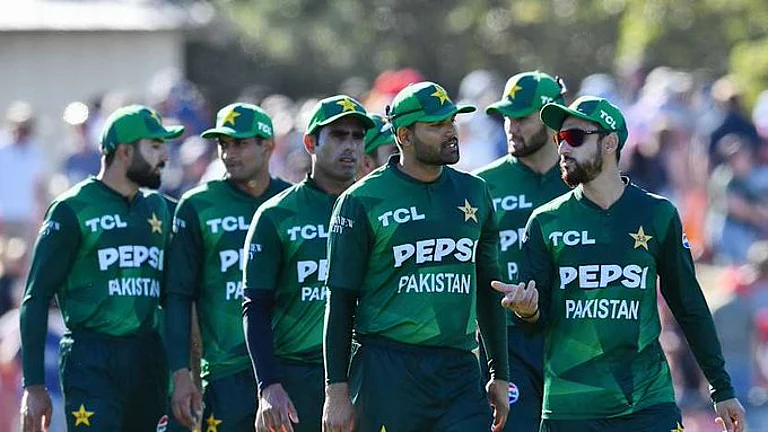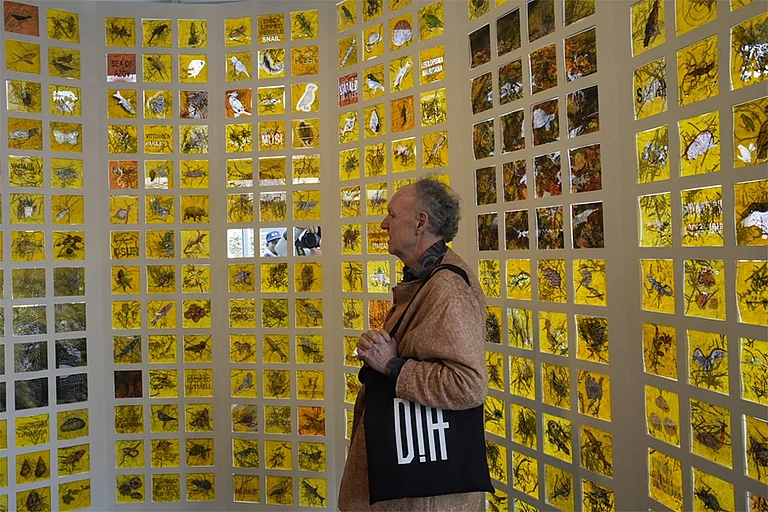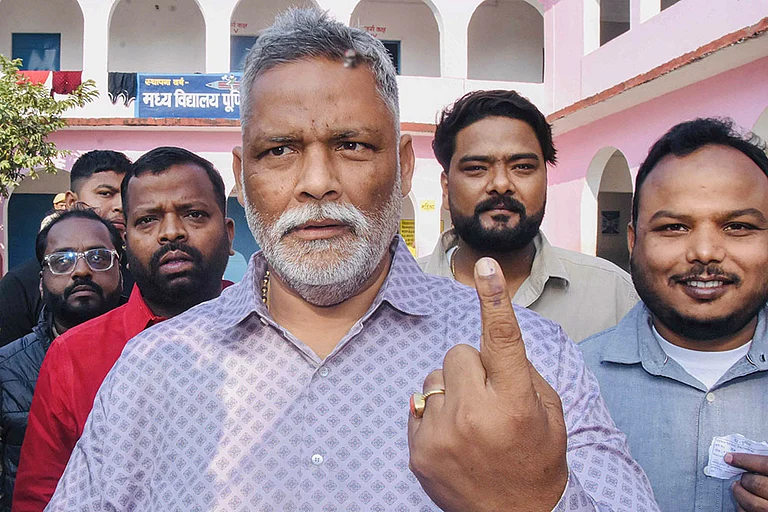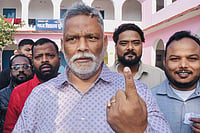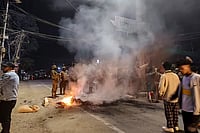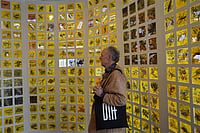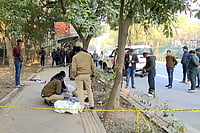They discussed, debated and shared experiences and, on the way, learnt several new intervention strategies to fight a disease that kills, is incurable and is preventable. People living with AIDS, women in prostitution, social activists, grassroots health workers, doctors, researchers, lawyers, bureaucrats, the Indian health minister—all of whom have been working in the area of AIDS for many years. Some met each other for the first time in Manila. To discover how similar was their work, or how different. The intense brain-storming threw up some core issues and problems that are typically Indian and which need typically Indian solutions. Here's the Big Six issues that seemed to emerge as being important for battling AIDS in India:
The Headcount—Hype & Reality
Is AIDS in India really overhyped? Well, the latest figures by MAP (Monitoring the AIDS Pandemic), distributed at the conference, indicate India as having more HIV infections than any other country in the world. But the estimated 2.5 million infections, MAP says, "should be considered in the context of the close to 970 million population of India". So it's not really an Epidemic. Not quite.
With only about 0.3 per cent prevalence of HIV, we have a rate much lower than many countries in the Asia-Pacific region. But then, we still are the country with the largest number of HIV infections in the world. Dictatorial China must be hiding numbers! And yet the plenary speech by the UNAIDS executive director, Peter Piot, did say India had more than half of the five to seven million Asian people living with HIV. He also said that in Maharashtra, the HIV prevalence rate for pregnant women under 20 years of age had risen from 2.3 to 3.5 per cent between 1994 and 1996 alone. That's scary. Still, is the HIV-scare being exaggerated in India, considering only 4,846 full-blown AIDS cases have been registered in a country with a near-billion population? But then, so many AIDS cases and deaths might be going unreported. So many might be living with HIV without testing themselves.
Yet, doesn't our country have many, many more deaths due to tuberculosis and malaria? Why not organise or attend conferences on those? "But that's like saying let the drinking water shortage be, we'll only tackle hunger now," said an activist. Added Dr Abhay Bang from Gadchiroli-based Society for Education, Action and Research in Community Health (SEARCH): "Already there is a new multi-resistant TB that thrives on AIDS. In metro India, about 20 per cent of AIDS patients suffer from TB. And once HIV spreads, TB will become impossible to control. " At any rate, HIV infections have doubled in the last three years. And projections are that these figures will double yet again by the end of the century. Some even say one out of every five Indian families will be HIV-infected by circa 2000. This meaningless numbers game has to be abandoned. AIDS, by nature, is a potential epidemic—and we need an approach that doesn't get stuck with statistical quibbles.
The New Untouchables
At an informal meeting of the Indian delegates, Geeta Sodhi of Delhi-based NGO Swasthya narrated an incident where a placard put up by authorities on an AIDS patient's bed in a government hospital read: 'Bio-hazard'. A disgusted Sodhi recalled running from pillar to post, protesting such blatant discrimination. "There was simply no mechanism to register such a protest," she complained.
Others had similar horrific tales to share. Meena Seshu of Sangram, a Sangli-based HIV/AIDs Prevention Centre that works with commercial sex workers in seven districts of western Maharashtra and northern Karnataka, said that the women patients she deals with are often subject to a double burden of discrimination. "Their status as commercial sex workers along with the stigma associated with AIDS renders them incapable of approaching government hospitals. The ward boys, the ayahs and the nurses often treat them as untouchables. They go to private doctors, selling off their gold first, then utensils, sometimes their clothes. We have had to arrange funerals for some because the disease cleans them out of all savings before they are through with it," she said.
A representative of the Indian Network for People Living with HIV/AIDS, a Chennai-based group that is working towards linking people living with infection, spoke of the rampant ostracism AIDS invites. "Families with AIDS patients are boycotted, workers thrown out—it's like treatment meted out to criminals. We are lobbying for laws that protect us against such humiliating discrimination," he said.
Trafficking—Highway to Hell
The screening of Ruchira Gupta's
Selling of Innocence , a powerful documentary on women and children trafficked from Nepal's villages into brothels in Mumbai, shocked viewers. The Emmy award-winning film showed hapless women caught in a position of subjugation and sexual violence and absolutely powerless to negotiate safe sex. With about 30 clients to service in a day, some of who believe sex with virgins cures STDs and AIDS, bottles often
shoved up their vaginas, cigarette butts stubbed out on them, these girls can hardly insist on the use of condoms to prevent AIDS. "A politician-police-pimp nexus which has institutionalised trafficking has made at least half a million women and children in the region vulnerable to the virus," argued Gupta.
Running a shelter in Kathmandu for girls who manage to escape or are discarded by brothels after they are infected by the HIV virus, Anuradha Koirala of Maiti Nepal emphasised the need for cross-border cooperation to combat the deadly virus that knows no geographical bounds. "It's senseless to give back girls infected with the virus and think they are part of another country's statistics now," she said.
Commercial sex worker Sadhna Mukerjee of Calcutta-based Mahila Samanwaya Committee, who works with her peers in Sonargachi district on an HIV/AIDS intervention project, said intra-country trafficking which sees girls from villages being brought into bigger towns and metros also renders them easy prey to the perils of unsafe sex. "Dragged in from some place, made to work in slavelike conditions, where is the opportunity to negotiate? The solution lies in unity. A customer who is refused sex without condoms goes to the next girl, she refuses too, so does the third, he finally completes the circle and agrees to use the condom," Mukerjee averred. "Breaking the police-politician nexus should be our ultimate goal but for now empowerment and peer education is the immediate and urgent solution."
Campaigns—Sustaining Myths
The conference presented the Indian NGOs with a unique opportunity to constructively criticise the government's public awareness campaigns before the members of the government-run National AIDS Control Organisation and bureaucrats of the Health Ministry. Radhika Chandramani, director of a sexual health helpline called Tarshi, observed that many hoardings ostensibly promoting AIDS awareness actually misinform and add to the confusion. "There is one hoarding with two men leering at a woman wearing a skimpy dress and holding a cigarette in her hand. Some callers have told us they are safe because they don't sleep with such types of women. But the hard fact is 'such' type of women are not available to 'such' type of men and neither are 'such' type of women the only ones who could give them the virus," the expert said.
The Surakshit Sambhog (Safe Sex) campaign being run by the state government, said Seshu from Sangli in Maharashtra, simply failed to get through to most of the women in the small towns. "The language is so far removed from the one that they speak or comprehend, that a woman once told me that never—despite all the hoardings she had read—had she known that her husband could give her the virus," Seshu said. And, for once, bureaucrats from the health ministry present on the occasion asked the NGOs to ignore red-tapism and tell them of a misfired campaign as and when they were spotted.
The Guinea Pig Question "I have been working in the area of medical research in AIDS for the past 12 years and have met the health minister for the first time," Dr Suniti Solomon of Bangalore-based YRG Centre for AIDS Research and Education told minister of state for health Renuka Chowdhary. Making most of the opportunity, the doctor spoke his mind: "Most of the money allocated for the disease goes towards AIDS prevention programmes. There are universities abroad that are willing to invest in research here. And we need their help. Currently, a university abroad has sanctioned us the technical help but we need to send them some blood samples so that we can begin the project. But there are laws in India against sending bio-medical samples abroad. Could the minister help?" The request threw light on yet another grey area in the agenda for AIDS in the country. With the developed West looking at the developing countries for human testing of many of its new drugs, a thriving organ-selling industry in the country and also the genuine need for biological sampling abroad, the Indian government might need to relook the laws on the subject.
Networking—Split Atoms
Duplicating research, groping for support or advice on issues, not knowing where to look and being unable to help with resource material and experience gathered through grassroots work seem to be some of the problems dogging the NGO sector working in the field of AIDS. "It took me a trip here to know that a group of doctors was also working on AIDS some 10 kilometers away from where I work. These contacts that I have made are going to help my work. They are the achievements of this conference," said Dr Vinay Kulkarni of Pune-based NGO Prayas.
Dr Ramesh Goud from Nasik-based NGO SOS—which works on sensitising the police forces, among others, towards HIV/AIDS—asked the health minister pointblank to announce a definite date when all the Indian NGOs working in the area could meet up with her. And an impromptu meeting saw Indian delegates at the conference chalking out an agenda to be presented to the minister in Delhi.
Back in Delhi now, the meeting is yet to happen. The networking still to be tested. The lessons learnt to be implemented. The promises made to be fulfilled. And the Virus to be combated.







